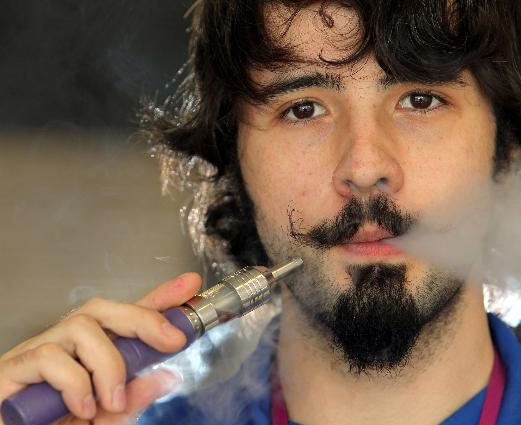States push to regulate, tax booming e-cigarette industry
By Barnini Chakraborty, Fox News
WASHINGTON – While waiting for the debate on electronic cigarettes to heat up on Capitol Hill, several state and local governments are pressing ahead with their own agendas for taxing and regulating the popular battery-powered smoking alternatives.
Right now, there is no uniform national approach to regulating the vapor-based e-cigarettes. They are mostly free from federal rules and typically are subject only to state sales taxes.
But lawmakers in more than two dozen cash-strapped states are racing to regulate them as a new source of revenue. For some, this means tacking on an excise tax — which is a fee on a specific product, and often dubbed a “sin tax” when applied to socially shunned products like cigarettes.
Minnesota has led the charge and is currently the only state that’s got a specific tax policy for e-cigarettes on the books. The 2012 decision subjects vapor inhalers to a 95 percent tax that is stapled to the wholesale cost of the product.
According to the Minnesota Department of Revenue, e-cigarettes are considered tobacco products and are subject to the state’s tobacco tax. Distributors there are required to pay the tobacco tax or risk losing their license. Retailers must purchase e-cigarettes from distributors licensed by the state and are expected to “collect and remit sales tax on e-cigarette sales.”
In total, Minnesota estimates it will bring in $1.16 billion from all of its tobacco taxes in fiscal year 2014-2015.
Other states are taking notice.
In his 2015 budget proposal last month, New Jersey Gov. Chris Christie pitched a plan to hike taxes on electronic cigarettes to match the rate of regular cigarettes — about $2.70 per pack.
Supporters say increasing taxes will keep them out of the hands of children and teens.
But critics argue treating traditional cigarettes the same as e-cigs will hurt small businesses and strip smokers of the incentive to quit.
“Small businesses like convenience stores and especially brick and mortar vape shops will be hardest hit by this $35 million tax increase,” Americans for Tax Reform President Grover Norquist wrote in a March 11-dated letter sent to the New Jersey Legislature and shared with FoxNews.com.
Norquist also warns that raising taxes on consumers will “significantly decrease in-state sales, resulting in increased cross-border tax leakage.”
In recent years, as much as 40 percent of all cigarettes smoked in New Jersey were smuggled into the state illegally, resulting in a loss of more than $500 million in uncollected tax revenue each year, he says.
“By making New Jersey uncompetitive in e-cigarette pricing, the state would encourage smuggling, which will cost New Jersey small businesses tens of thousands of dollars in lost revenue,” he said.
But to some, like New Jersey Democratic Assemblyman Dan Benson, taxing e-cigarettes is not only a fiscal responsibility but also sends an important message to would-be smokers.
“If e-cigarettes are taxed less than regular cigarettes, we’re sending a message out there that they’re somehow safer, and I think the jury is out on that,” he recently told a New Jersey radio station.
Meanwhile, a similar proposal in Washington state recently died in the Legislature. That plan would have redefined “vapor products” – the kind used in e-cigarettes – as “tobacco substitutes” and “tobacco products.” By changing their classification to a tobacco product, lawmakers were initially hoping to slap a 95 percent tax on them, projected to generate an additional $40 million for the state.
According to the Centers for Disease Control and Prevention, the vapor from e-cigarettes has “far fewer of the toxins found in smoke compared to traditional cigarettes.”
However, the Atlanta-based agency says it’s too soon to say how much of a health benefit the alternative to traditional cigarettes offers. Both traditional cigarettes and e-cigarettes contain nicotine.
Tim McAfee, CDC’s director of Smoking and Health, says while it’s reasonably certain that if someone who smokes a pack a day switched completely to e-cigarettes it could represent a health benefit, there are still many “caveats and buts” around that.
Many argue that the reason state and local leaders are pushing so hard to tax e-cigarettes is because they’ve become addicted to the massive amounts of money brought in through the Master Settlement Agreement – a 25-year settlement that forces the nation’s top tobacco companies to pay out billions of dollars in profit to help pay for smoking-related health care costs in some states.
The 1998 settlement, for example, makes Philip Morris USA, the nation’s largest cigarette maker, pay $3.5 billion annually. The second-largest tobacco company, Reynolds Tobacco Co., has handed out more than $2 billion a year.
In total, the landmark settlement requires tobacco product manufacturers to make $206 billion in payments to 46 states and U.S.-territories.
If e-cigarettes are regulated the same way, that might mean millions more for states still struggling to find financial footing following the recession.
Utah, North Dakota and the District of Columbia have included e-cigarettes as part of their indoor-smoking bans, setting up the argument that the vapor sticks should be regulated like other tobacco products in the state. Wyoming, Tennessee, New York and Colorado are among nine other states that have already dumped e-cigarettes into the tobacco product category.
http://www.foxnews.com/politics/2014/03/18/states-push-to-regulate-tax-booming-e-cigarette-industry/


